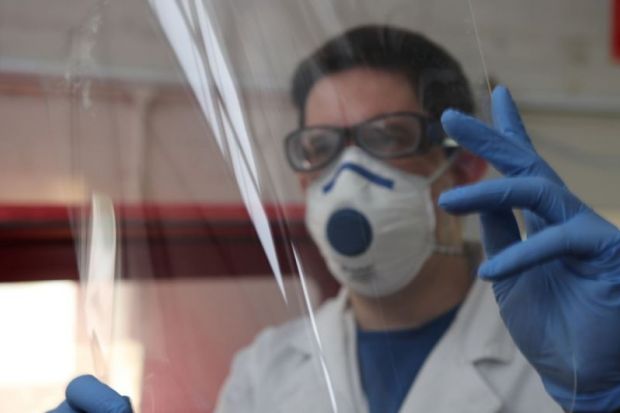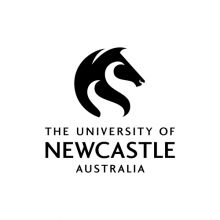Months ago, Australia’s universities deployed their facilities, personnel and ingenuity to help battle the bushfires. Now they are back in the trenches combating the coronavirus.
University of Newcastle academics are producing face shields for use by frontline health workers, using polyester originally intended for making solar cells. Physicists, engineers and health scientists collaborated to create the protective equipment from plastic, foam and elastic headbands.
“The design is simple and fast to assemble, so we’re able to generate hundreds a day,” said Paul Dastoor, director of Newcastle’s Centre for Organic Electronics. Local company Guru Labels is helping by laser-cutting the polyester in bulk.
The University of Wollongong is 3D-printing face shields using an open source design, and is investigating the mass production of ventilator components.
Meanwhile, scientists at the University of Technology Sydney (UTS) are helping local company Claralumen ramp up production of an algae-based hand sanitiser for medicos with sensitive skin.
The company, which generates the product in 50 litre batches, will trial manufacturing 10 times that volume in UTS’ Biologics Innovation Facility (BIF). “Upscaling production comes with risks,” said Claralumen CEO Cat Fuller, a UTS graduate. “Using BIF means we can do the fine tuning at scale but manage complexity. It also means we can speed up the process of achieving much larger production runs.”
In a “virtual hospital trial”, the University of New England (UNE) is preparing to deploy 160 wireless monitors to help ease the pressure on the region’s health system. They will transmit data on the temperature, heart rates and blood oxygen levels of homebound patients to a “flight desk” in a hospital in Armidale, where UNE is based.
The system was designed by the head of UNE’s School of Rural Medicine, Rod McClure, inspired by insights he had gained as director of the research division at the US Centers for Disease Control and Prevention. Intended to help overcome the paucity of doctors in rural areas, it was reconfigured as the epidemic threatened to strain regional health facilities which had few respirators or intensive care units.
The University of Melbourne’s Mobile Learning Unit has developed an online course which trains doctors, nurses and paramedics to perform bedside lung ultrasound scans, in an effort to speed up clinical decisions.
The free course takes about 30 hours, including simulation exercises. Course director Alistair Royse said lung ultrasounds were better than stethoscope examinations, more sensitive than chest x-rays and far simpler and faster than CT-scans. “Covid-19 patients can become critically ill within hours,” he said. “The ultrasound is able to identify subtle early changes, [allowing for] early interventions.”
Deakin University has launched a longitudinal survey to track the impact of isolation on people’s mental health, quizzing 2,000 families every fortnight for six months.
Deakin psychologist Elizabeth Westrupp said social distancing risked causing “chronic family stress”, exacerbating mental ill-health and triggering violence. “This study can provide timely information and tools for successful clinical and public health interventions.”
Victoria University of Wellington pharmacologist Davide Comoletti is part of a New Zealand research team developing a “decoy molecule” to lure the virus away from lung cells. The receptor, administered by inhaler, would bind to the virus so that it could be harmlessly expelled in mucus.
Dr Comoletti admitted that the idea was a long shot. “Doing nothing, however, is not an option.”
Register to continue
Why register?
- Registration is free and only takes a moment
- Once registered, you can read 3 articles a month
- Sign up for our newsletter
Subscribe
Or subscribe for unlimited access to:
- Unlimited access to news, views, insights & reviews
- Digital editions
- Digital access to THE’s university and college rankings analysis
Already registered or a current subscriber? Login












